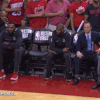Post#689 » by mtron929 » Tue Nov 29, 2016 2:16 pm
Couple of things.
1a) There should really be a separate discussion on (a) who you think the MVP will be vs (b) who you think the MVP should be. Because different people might be arguing about (a) vs (b) which means that the conversation for the most part can just be a big misunderstanding. For example, when someone says that "Lebron is the MVP", the person might be arguing that Lebron will be the MVP (even if he thinks someone else should be the MVP) or he might be saying Lebron should be the MVP. Apples and oranges.
1b) I think between (a) and (b), (b) is the more interesting discussion. That is, this gets into the heart of what we think MVP should be as opposed to how it is viewed currently by the writers. So with that being said...
2) Although the discussion on who should be the MVP is pretty much subjective, whatever criterion that you have should consistently hold under all different scenarios and not lead to absurd outcomes. Or else, you need to re-examine your criterion. For example, many people here claim that Durant should not get the MVP because he is on a loaded team. Let's take this to an extreme example. Let's say hypothetically, there is a superteam that has all 12 of the NBA's best players (e.g. Lebron, Durant, Curry, Harden, Westbrook, Davis, CP3, ...). And obviously, this team will win 75+ games and easily win the championship. I think some people here will argue that none of the 12 best players deserve the MVP award because they are all on the stacked team. And that whoever is the 13th best player (e.g. Damian Lillard) on a far inferior team deserves the MVP award. But then, one can create another stacked team where we have 13th 24th best players all on the same team. Then, it seems like the 25th best player should be the best team (until we keep on creating superteams). At certain point, we would have a weird scenario where no one on stacked teams deserve the MVP so you might have someone like Rudy Gay winning the MVP if he is the best player that is not on a stacked team. This does not make sense. Which leads me to believe that
proposition #1: a player is on a stacked team should not automatically be disqualified.
3) We need to examine history and think about the regrettability factor in some of the previous MVP awards. In general, the regretable circumstances always tend to come when it seems like a guy who was not the best player in the NBA won the award because he did most for his team. For example, we can think about guys like Derrick Rose, Steve Nash, and Allen Iverson, which are all brought up as cases where they were not the best players in the NBA but seemed like they were instrumental in their own team's overachievement. So this is something that we should look out for. That is, if we want to vote in someone like Westbrook or Harden over someone like Lebron because they seem to be doing more with inferior teammates, we should look back to history and realize that we might be on the wrong side of history when it comes to future evaluations on the 2016-17 MVP award. You don't want to be the guy who adamantly supported for Derrick Rose to get the MVP in 2011 while staying silent 6 years in the future when Rose is brought up as an example of one of the worst MVP selections of all time. Which leads me to my next proposition..
proposition #2: when in doubt, give the best player the award. History will look kindly on this "mistake".
So with that said, the clear MVP (thus far in the season) is Lebron James.












 +
+  =
= 







